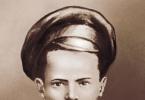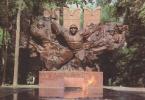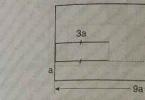I remember a wonderful moment:
You appeared before me
Like a fleeting vision
Like a genius of pure beauty.
In the languor of hopeless sadness,
In the anxieties of noisy bustle,
A gentle voice sounded to me for a long time,
And dreamed of cute features.
Years passed. Storms gust rebellious
Scattered old dreams
And I forgot your gentle voice
Your heavenly features.
In the wilderness, in the darkness of confinement
My days passed quietly
Without a god, without inspiration,
No tears, no life, no love.
The soul has awakened:
And here you are again
Like a fleeting vision
Like a genius of pure beauty.
And the heart beats in rapture
And for him they rose again
And deity, and inspiration,
And life, and tears, and love.
Pushkin, 1825
Kern, Anna Petrovna(1800-1879) - niece of Pushkin's neighbor P. A. Osipova. Stayed in the summer of 1825 in Trigorskoye.
In the first stanza, the poet recalls the first meeting with her, in 1819, in St. Petersburg, in the Olenins' house.
Kern wrote about how Pushkin gave her these poems on the day of her departure from Trigorskoye:
« He came in the morning and, in parting, brought me a copy of the 2nd chapter of Onegin, in uncut sheets, between which I found a four-fold postal sheet of paper with verses: “I remember a wonderful moment,” and so on. When I was about to hide the poetic gift in the box, he looked at me for a long time, then convulsively grabbed it and did not want to return it; I forcefully begged them again; what flashed through his head then - I don’t know».
A.S. Pushkin, like any poet, experienced the feeling of love very keenly. All his experiences, sensations poured out on a sheet of paper with wonderful verses. In his lyrics you can see all the facets of feelings. The work "I remember a wonderful moment" can be called a textbook example of the poet's love lyrics. Probably, every person can easily recite at least the first quatrain of the famous poem by heart.
In fact, the poem, "I remember a wonderful moment" is a story of one love. The poet in a beautiful form conveyed his feelings about several meetings, in this case about the two most significant ones, managed to touchingly and sublimely convey the image of the heroine.
The poem was written in 1825, and in 1827 it was published in the almanac "Northern Flowers". The publication was handled by a friend of the poet - A. A. Delvig.
In addition, after the publication of the work of A.S. Pushkin began to appear various musical interpretations of the poem. So, in 1839 M.I. Glinka created the romance "I remember a wonderful moment ..." to the verses of A.S. Pushkin. The reason for writing the romance was Glinka's meeting with Anna Kern's daughter, Ekaterina.
To whom is it dedicated?
A poem is dedicated to A.S. Pushkin to the niece of the President of the Academy of Arts Olenin - Anna Kern. For the first time the poet saw Anna in Olenin's house in St. Petersburg. This was in 1819. At that time, Anna Kern was married to a general and did not pay attention to the young graduate of the Tsarskoye Selo Lyceum. But that same graduate was fascinated by the beauty of the young woman.
The second meeting of the poet with Kern happened in 1825, it was this meeting that served as the impetus for writing the work “I Remember a Wonderful Moment”. Then the poet was in exile in the village of Mikhailovskoye, and Anna arrived at the neighboring Trigorskoye estate. They had a fun and carefree time. Later, Anna Kern and Pushkin had more friendly relations. But those moments of happiness and delight are forever imprinted in the lines of Pushkin's work.
Genre, size, direction
The work belongs to love lyrics. The author reveals the feelings and emotions of the lyrical hero, who remembers the best moments of his life. And they are connected with the image of the beloved.
The genre is a love letter. “... You appeared before me ...” - the hero refers to his “genius of pure beauty”, she became a consolation and happiness for him.
For this work A.S. Pushkin chooses iambic pentameter and cross type of rhyme. With the help of these means, the feeling of the story is conveyed. It is as if we see and hear the lyrical hero live, who slowly tells his story.
Composition
The ring composition of the work is based on antithesis. The poem is divided into six quatrains.
- The first quatrain tells of the "wonderful moment" when the hero first saw the heroine.
- Then, in contrast, the author draws heavy, gray days without love, when the image of the beloved gradually began to fade from memory.
- But in the finale, the heroine appears to him again. Then in his soul again resurrects "and life, and tears, and love."
Thus, the work is framed by two wonderful meetings of heroes, a moment of charm and insight.
Images and symbols
The lyrical hero in the poem “I remember a wonderful moment ...” is a person whose life changes as soon as an invisible feeling of attraction to a woman appears in his soul. Without this feeling, the hero does not live, he exists. Only beautiful image pure beauty can fill his being with meaning.
In the work we meet all kinds of symbols. For example, the image-symbol of a storm, as the personification of everyday adversity, everything that the lyrical hero had to endure. The image-symbol "the darkness of imprisonment" refers us to the real basis this poem. We understand that this refers to the exile of the poet himself.
And the main symbol is the "genius of pure beauty." It is something incorporeal, beautiful. So, the hero elevates and spiritualizes the image of his beloved. Before us is not a simple earthly woman, but a divine being.
Topics and issues
- The central theme in the poem is love. This feeling helps the hero to live and survive in harsh days for him. In addition, the theme of love is closely related to the theme of creativity. It is the excitement of the heart that awakens inspiration in the poet. The author can create when all-consuming emotions bloom in his soul.
- Also, A. S. Pushkin, like a real psychologist, very accurately describes the state of the hero in different periods his life. We see how strikingly contrasting are the images of the narrator at the time of the meeting with the "genius of pure beauty" and at the time of his imprisonment in the wilderness. It's like two completely different people.
- In addition, the author touched upon the problem of lack of freedom. He describes not only his physical bondage in exile, but also inner prison when a person closes in on himself, fences himself off from the world of emotions and bright colors. That is why those days of loneliness and longing became a prison for the poet in every sense.
- The problem of separation appears before the reader as an inevitable but bitter tragedy. Life circumstances are often the cause of a gap that hurts the nerves, and then hides in the depths of memory. The hero even lost a bright memory of his beloved, because the awareness of the loss was unbearable.
Idea
The main idea of the poem is that a person cannot live fully if his heart is deaf and his soul is asleep. Only by opening up to love, its passions, you can truly feel this life.
The meaning of the work is that just one small, even insignificant event for others can completely change you, your psychological picture. And if you change yourself, then your attitude to the world around you also changes. So one moment can change your world, both external and internal. You just need not to miss it, not to lose it in the hustle and bustle of days.
Means of artistic expression
In his poem A.S. Pushkin uses a variety of paths. For example, to more vividly convey the state of the hero, the author uses the following epithets: “wonderful moment”, “hopeless sadness”, “tender voice”, “heavenly features”, “noisy bustle”.
We meet works and comparisons in the text, so already in the first quatrain we see that the appearance of the heroine is compared with a fleeting vision, and she herself is compared with the genius of pure beauty. The metaphor “a rebellious storm dispelled former dreams” emphasizes how time unfortunately takes away from the hero his only consolation - the image of his beloved.
So, beautifully and poetically, A.S. Pushkin was able to tell his love story, unnoticed by many, but dear to him.
Interesting? Save it on your wall!"I remember a wonderful moment..." Alexander Pushkin
I remember a wonderful moment:
You appeared before me
Like a fleeting vision
Like a genius of pure beauty.In the languor of hopeless sadness
In the anxieties of noisy bustle,
A gentle voice sounded to me for a long time
And dreamed of cute features.Years passed. Storms gust rebellious
Scattered old dreams
And I forgot your gentle voice
Your heavenly features.In the wilderness, in the darkness of confinement
My days passed quietly
Without a god, without inspiration,
No tears, no life, no love.The soul has awakened:
And here you are again
Like a fleeting vision
Like a genius of pure beauty.And the heart beats in rapture
And for him they rose again
And deity, and inspiration,
And life, and tears, and love.
Analysis of Pushkin's poem "I remember a wonderful moment ..."
One of the most famous lyrical poems by Alexander Pushkin "I remember a wonderful moment ..." was created in 1925, and has a romantic background. It is dedicated to the first beauty of St. Petersburg, Anna Kern (nee Poltoratskaya), whom the poet first saw in 1819 at a reception at the house of her aunt, Princess Elizabeth Olenina. Being by nature a passionate and temperamental person, Pushkin immediately fell in love with Anna, who by that time was married to General Yermolai Kern and raised her daughter. Therefore, the laws of decency of secular society did not allow the poet to openly express his feelings to the woman to whom he was introduced only a few hours ago. In his memory, Kern remained "a fleeting vision" and "a genius of pure beauty."
In 1825, fate again brought Alexander Pushkin and Anna Kern together. This time - in the Trigorsk estate, not far from which was the village of Mikhailovskoye, where the poet was exiled for anti-government poetry. Pushkin not only recognized the one that 6 years ago captivated his imagination, but also opened up to her in his feelings. By that time, Anna Kern had broken up with her "soldafon husband" and led a rather free lifestyle, which caused condemnation in secular society. Her endless romances were legendary. However, Pushkin, knowing this, was nevertheless convinced that this woman was a model of purity and piety. After the second meeting, which made an indelible impression on the poet, Pushkin wrote his famous poem.
The work is a hymn to female beauty, which, according to the poet, can inspire a man to the most reckless exploits. In six short quatrains, Pushkin managed to fit the whole story of his acquaintance with Anna Kern and convey the feelings that he experienced at the sight of a woman who captivated his imagination for many years. In his poem, the poet admits that after the first meeting, “a gentle voice sounded to me for a long time and I dreamed of cute features.” However, by the will of fate, youthful dreams remained in the past, and "a rebellious storm dispelled former dreams." For six years of separation, Alexander Pushkin became famous, but at the same time, he lost the taste of life, noting that he had lost the sharpness of feelings and inspiration, which has always been inherent in the poet. The last straw in the sea of disappointment was the exile to Mikhailovskoye, where Pushkin was deprived of the opportunity to shine in front of grateful listeners - the owners of neighboring landowners' estates had little interest in literature, preferring hunting and drinking.
Therefore, it is not surprising that when, in 1825, General Kern with her elderly mother and daughters came to the Trigorskoye estate, Pushkin immediately went to the neighbors on a courtesy call. And he was rewarded not only with a meeting with the "genius of pure beauty", but also awarded her favor. Therefore, it is not surprising that the last stanza of the poem is filled with genuine delight. He notes that "the deity, and inspiration, and life, and a tear, and love, have risen again."
Nevertheless, according to historians, Alexander Pushkin interested Anna Kern only as a fashionable poet, fanned by the glory of rebelliousness, the price of which this freedom-loving woman knew very well. Pushkin himself misinterpreted the signs of attention from the one that turned his head. As a result, a rather unpleasant explanation took place between them, which dotted the "i" in the relationship. But even despite this, Pushkin dedicated many more delightful poems to Anna Kern, for many years considering this woman, who dared to challenge the moral foundations of high society, her muse and deity, before whom she bowed and admired, despite gossip and gossip.
I remember a wonderful moment: You appeared before me, Like a fleeting vision, Like a genius of pure beauty. In the languor of hopeless sadness In the anxieties of the noisy bustle, A gentle voice sounded to me for a long time And sweet features dreamed. Years passed. A rebellious storm has dispelled former dreams, And I forgot your gentle voice, Your heavenly features. In the wilderness, in the darkness of confinement My days dragged on quietly Without a deity, without inspiration, Without tears, without life, without love. The soul has awakened: And here again you appeared, Like a fleeting vision, Like a genius of pure beauty. And the heart beats in rapture, And for him resurrected again And the deity, and inspiration, And life, and tears, and love.
The poem is addressed to Anna Kern, whom Pushkin met long before his forced seclusion in St. Petersburg in 1819. She made an indelible impression on the poet. The next time Pushkin and Kern saw each other only in 1825, when she was visiting the estate of her aunt Praskovya Osipova; Osipova was a neighbor of Pushkin and a good friend of his. It's believed that new meeting inspired Pushkin to create an epoch-making poem.
The main theme of the poem is love. Pushkin presents a capacious sketch of his life between the first meeting with the heroine and the present moment, indirectly mentioning the main events that happened to the biographical lyrical hero: a link to the south of the country, a period of bitter disappointment in life, in which works of art, imbued with feelings of genuine pessimism (“The Demon”, “Desert Sower of Freedom”), depressed mood during the period of a new exile in family estate Mikhailovskoye. However, suddenly comes the resurrection of the soul, the miracle of the rebirth of life, due to the appearance of the divine image of the muse, which brings with it the former joy of creativity and creation, which opens up to the author in a new perspective. It is at the moment of spiritual awakening lyrical hero meets the heroine again: “The awakening has come to the soul: And here again you appeared ...”.
The image of the heroine is essentially generalized and maximally poeticized; it is significantly different from the image that appears on the pages of Pushkin's letters to Riga and friends, created during the period of forced pastime in Mikhailovsky. At the same time, the equal sign is unjustified, as is the identification of the “genius of pure beauty” with the real biographical Anna Kern. The impossibility of recognizing the narrowly biographical background of the poetic message is indicated by the thematic and compositional similarity with another love poetic text called “To Her”, created by Pushkin in 1817.
It is important to remember the idea of inspiration here. Love for the poet is also valuable in the sense of giving creative inspiration, the desire to create. The title stanza describes the first meeting of the poet and his beloved. Pushkin characterizes this moment with very bright, expressive epithets (“ wonderful moment”, “a fleeting vision”, “a genius of pure beauty”). Love for a poet is a deep, sincere, magical feeling that completely captures him. The next three stanzas of the poem describe the next stage in the life of the poet - his exile. A difficult time in the fate of Pushkin, full of life's trials and experiences. This is the time of "languishing hopeless sadness" in the soul of the poet. Parting with his youthful ideals, the stage of growing up (“Scattered former dreams”). Perhaps the poet also had moments of despair (“Without a deity, without inspiration”) The author’s exile is also mentioned (“In the wilderness, in the darkness of imprisonment ...”). The life of the poet seemed to freeze, lost its meaning. Genre - message.
Genius of pure beauty
Genius of pure beauty
From the poem "Lalla hands" (1821) by the poet Vasily Andreevich Zhukovsky (17 "83-1852):
Oh! does not live with us
Genius of pure beauty;
Only occasionally does he visit
Us from heavenly beauty;
He is hasty, like a dream,
Like an airy morning dream;
But in holy remembrance
He is not separated from his heart.
Four years later, Pushkin uses this expression in his poem "I remember a wonderful moment ..." (1825), thanks to which the words "genius of pure beauty" will become popular. In his lifetime editions, the poet invariably singled out this line of Zhukovsky in italics, which, according to the customs of that time, meant that it was a quotation. But later this practice was abandoned, and as a result, this expression began to be considered Pushkin's poetic find.
Allegorically: about the embodiment of the ideal of female beauty.
encyclopedic Dictionary winged words and expressions. - M.: "Lokid-Press". Vadim Serov. 2003 .
Synonyms:
See what the "Genius of Pure Beauty" is in other dictionaries:
Princess, madonna, goddess, queen, queen, woman Dictionary of Russian synonyms. genius of pure beauty n., number of synonyms: 6 goddess (346) ... Synonym dictionary
I remember a wonderful moment, You appeared before me, Like a fleeting vision, Like a genius of pure beauty. A. S. Pushkin. K A. Kern ... Michelson's Big Explanatory Phraseological Dictionary (original spelling)
- (lat. genius, from gignere to give birth, to produce). 1) power, to heaven, creates in science or art something out of the ordinary, makes new discoveries, points out new paths. 2) a person with such power. 3) according to the concept of ancient. Romans... ... Dictionary foreign words Russian language
genius- I, m. génie f., German. Genius, pol. geniusz lat. genius. 1. According to the religious beliefs of the ancient Romans, God is the patron of a person, city, country; spirit of good and evil. Sl. 18. The Romans brought incense, flowers and honey to their Angel or according to their Genius. ... ... Historical dictionary gallicisms of the Russian language
GENIUS, genius, husband. (lat. genius) (book). 1. Higher creativity in scientific or artistic activity. Scientific genius of Lenin. 2. A person with a similar ability. Darwin was a genius. 3. In Roman mythology, the lowest deity, ... ... Dictionary Ushakov
- ... Wikipedia
- (1799 1837) Russian poet, writer. Aphorisms, quotes Pushkin Alexander Sergeevich. Biography It is not difficult to despise the court of people, it is impossible to despise one's own court. Backbiting, even without evidence, leaves eternal traces. Critics... ... Consolidated encyclopedia of aphorisms
In a strict sense, the use of literary work an artistic image or a verbal turnover from another work, designed for the reader to recognize the image (A. S. Pushkin’s line “Like a genius of pure beauty” is borrowed from ... ... encyclopedic Dictionary
Cm … Synonym dictionary
Books
- Anna Kern. Life in the name of love (deluxe edition), Vladimir Sysoev. Stylish gift edition. The book is decorated with gold stamping and lace. Pushkin's inspiration, "the genius of pure beauty", the victim of a despotic husband, the heroine of numerous novels, the author ...




